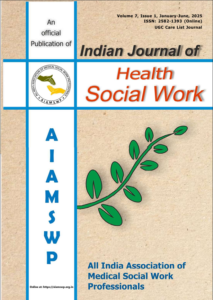Indian Journal of Health Social Work
(UGC Care List Journal)
Psychological Distress and Well-Being: A Cross-sectional Study of Adults in Asansol
Moumee Jesmin1, & Shaurya Prakash2
1 Development Practitioner, EHSAAS- Feel the Desire of Nature and Society, Mithani, Asansol, West Bengal,2 Assistant Professor, Gopal Narayan Singh University, Jamuhar, Sasaram, Bihar & Research Scholar, Department of Social Work, Visva-Bharati, Santiniketan, West Bengal
Correspondence: Shaurya Prakash, e-mail id: sauryap75@gmail.com
ABSTRACT
Background: A generic phrase used to describe unpleasant feelings or emotions that affect a person’s level of functioning is psychological distress. Health, pleasure, and affluence are perceived as indicators of well-being status. It entails having a positive outlook on life, feeling fulfilled in your work and relationships, and being able to handle stress. Aim: To examine the relationship between psychological distress and the Well-Being status of adults in Asansol, West Bengal. Materials and Methods: A cross-sectional study following quantitative research approach conducted in Asansol, West Bengal. The researchers adopted simple random sampling to reach the respondents. The data was collected using DASS and World Health Organization-Five WellBeing Index. Results and Conclusion: A more or less equal proportion of male and female respondents were found in the study sample. Only 13% of the adults were married, and the remaining 87% were unmarried. The findings of the study reveals that there is no significant age variation among the male and female adult respondents on the basis of age pattern. There is no gender difference on the basis of educational status among male and female respondents. If we look at the depression status, there is a significant gender variation that exists among the male and female respondents. On the basis of anxiety level, there is a slight variation between male and female respondents; females have more anxiety than male adult respondents. Stress levels differ significantly between male and female respondents, with females being more stressed than male adult respondents.
Keywords: Psychological distress, well-being, adult..

ISSN: 2582-1393 (online)
UGC Care List Journal

